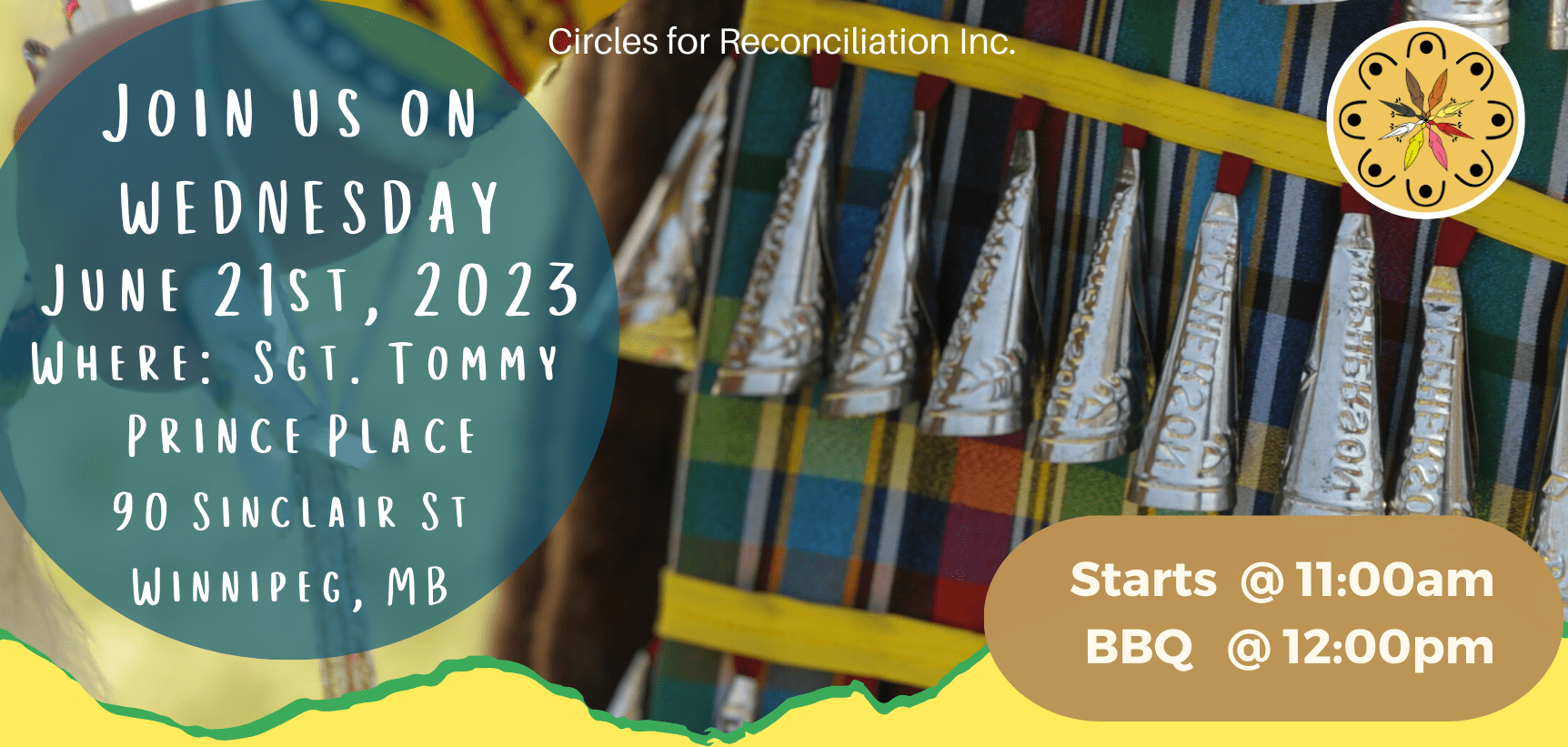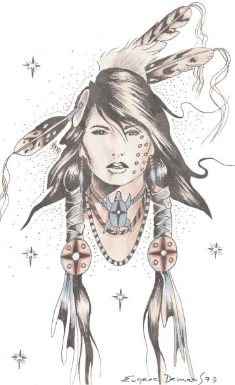NATIONAL INDIGENOUS PEOPLES DAY

Listen
Radio Station NCI FM interviews Grace Schedler from CFR about all the activities taking place for National Indigenous Peoples Day on June 21st. June 9/23 – used with permission.
Wednesday, June 21st 11am - 2:30 pm
The Winnipeg administrative offices of Circles for Reconciliation Inc. are on Treaty 1 territory – the traditional land of the Ininiw (Cree), Anishinábé (Ojibwé), Anishiniw (Ojibwé Cree), Dakota and Dene people, as well as the Birthplace of the Métis Nation and the Heart of the Métis Homeland. Circles for Reconciliation is an Indigenous-led non-profit corporation, with at least 51 % of our Board of Directors being peoples of First Nation, Inuit, or Métis status. Circles for Reconciliation is a registered charity, registration no. 748256930RR0001.
Our Circles for Reconciliation team in Tkaronto are grateful to have the opportunity to meet and work on the traditional territory of the Mississaugas of the Credit, the Anishnabeg, the Chippewa, the Haudenosaunee and the Wendat peoples. We also acknowledge that Tkaronto is covered by Treaty 13 signed with the Mississaugas of the Credit, and the Williams Treaties signed with multiple Mississaugas and Chippewa bands.
What we do
The aim of Circles for Reconciliation is to establish trusting, meaningful relationships between Indigenous and non-Indigenous peoples as part of the 94 Calls to Action from the Truth and Reconciliation Commission (TRC).
The means to achieve this is the creation of small gatherings of an equal number of Indigenous and non-Indigenous people in discussion circles.
Every Circle needs five Indigenous and five non-Indigenous participants. Relationships are built by equal voices.

How we do it
- Each group of ten participants, led by two trained facilitators, meets weekly or biweekly for ten gatherings 90 minutes in length.
- These ten meetings allow for the beginnings of respectful relationships, which the TRC stresses is the basis of reconciliation.
- The participants sit in a circle, providing greater opportunities for sharing and being respectful of traditional Indigenous values and customs.
- Themes for each Circle continue to be developed and, where necessary, are being adapted to different Indigenous customs and practices across Canada.
Did you know...?
Reviving the Rocky Cree Language
The key to the survival of the Rocky Cree language may very well reside in the discovery of a 350 year old Rocky Cree womannear present day South Indian Lake.
The Rocky Cree communities are the six First Nation communities in Manitoba that live along the “Churchill River”. The discovery of this long lost Indigenous woman will now serve as an impetus for reviving the Rocky Cree language.
William Dumas, works as the First Nations Language & Culture Facilitator for Manitoba First Nations Education Resource Centre (MFNERC) and he is worried about the survivability of the Rocky Cree language given that it is spoken less and less and is only being spoken by the older generation, says Dumas in a “YouTube video“ filmed at Paint Lake in the Traditional Territory of the Rocky Cree. Dumas hopes to preserve the Rocky Cree Language by documenting the “language, history, concepts, and holistic way of life of the Rocky Cree … directly from the knowledge keepers”. Dumas also wants to develop an educational Resource App to assist Indigenous Students with the retention of the Rocky Cree language. The seven year project is its second year and is been done in conjunction with The University of Winnipeg, the Indigenous Inclusion Directorate of the Manitoba Government and MFNERC.
It is hoped the resource will become part of the regular Manitoba educational curriculum. The project is one of the key recommendations of the Truth and Reconciliation’s 94 Calls To Action. There is additional info at this link.
The Manitoba government will “waive” all processing fees indefinitely for those Residential School Survivors who were stripped of their traditional Indigenous name upon entering into a Residential School. The move is in response to the Truth and Reconciliation Commission Call to Action # 17 which called for “all levels” of government to waive all administrative fees for Survivors trying to get back their real Traditional names.
The BC Government did a similar move earlier this year when they allowed Indigenous People to reclaim their names like when they allowed a baby boy to have his legal name, “λugʷaləs” to appear on his BC Birth Certificate.
Circles for Reconciliation would like to thank all those who participated in our National Indigenous Peoples Day BBQ and Circle.
A Big Thank You
We would like to thank all those who helped make National Indigenous Peoples Day a huge celebration! The number of volunteers from the schools, resource agencies, individuals and teams of volunteers! The teepee which was brought by retired Sgt. Lester Houle and his helper. The 7 Eleven truck and caterers. Staff at Sgt. Tommy Prince Place. All the entertainers, exhibitors, artisans, CFR Facilitators and Staff and so much more! Donations of water, snacks, books and items for the prize draws. Longer acknowledgements to follow.
In the mean time, please select this Link for some aerial drone footage of our June 21, 2023 event
View the “Did you know?” archives at this link.
 Chief Andy Rickard of Garden River First Nation participated in a ten session Circle for Reconciliation (Zoom) with the Canadian Museum for Human Rights staff in the spring of 2021. He shared his views in this video.
Chief Andy Rickard of Garden River First Nation participated in a ten session Circle for Reconciliation (Zoom) with the Canadian Museum for Human Rights staff in the spring of 2021. He shared his views in this video.
“Reconciliation is needed in order for us to move forward in a good way as two nations. If we are able to do our part as partners; non-indigenous and Indigenous people to have that understanding, that deep respect for each other then I think the future of our relationship will be much brighter and our children will have a much better life being able to live in this country coexisting in harmony with our nation, brothers and sisters.”
